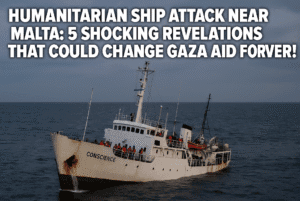Humanitarian Ship Attack Near Malta: 5 Shocking Revelations That Could Change Gaza Aid Forever!
A humanitarian vessel operated by the Freedom Flotilla Coalition was struck by suspected drone fire in international waters near Malta, damaging its generator and causing flooding. The Conscience, carrying 30 activists—including four Australians preparing to deliver aid to Gaza—was reportedly targeted while stationary, sparking outrage among organizers who denied any onboard weapons. Maltese authorities confirmed all 16 crew and passengers were safe but refused evacuation offers, leaving the ship adrift.
The incident revives tensions over Gaza’s blockade, echoing Israel’s deadly 2010 raid on the Mavi Marmara aid flotilla. Activists emphasized their mission’s peaceful intent amid growing scrutiny over risks to humanitarian efforts. No group claimed responsibility, but suspicions linger over geopolitical motives. The attack underscores the perilous challenges of bypassing Gaza’s siege, with critics condemning the assault as an escalation against civilian-led aid. Investigations are urged as global calls mount to address Gaza’s deepening crisis.

Humanitarian Ship Attack Near Malta: 5 Shocking Revelations That Could Change Gaza Aid Forever!
In a dramatic escalation of tensions surrounding aid missions to Gaza, a vessel operated by pro-Palestinian activists was reportedly struck by drone fire early Tuesday in international waters near Malta. The incident has reignited debates over the risks faced by humanitarian groups attempting to bypass Israel’s blockade of Gaza and the broader geopolitical stakes of such missions.
What Happened?
The Conscience, a passenger ship affiliated with the Freedom Flotilla Coalition, was allegedly hit twice near its bow around midnight local time, approximately 13 nautical miles east of Malta. Activists claim the strikes disabled the ship’s generator, leaving it without power and taking on water. The vessel carried 30 crew members and activists, including four Australians preparing to join the mission in Malta. Their goal: to deliver food and medical supplies to Gaza, which has faced severe shortages under Israel’s 16-year blockade.
Maltese authorities confirmed the ship’s 12 crew and four passengers were safe, with a tugboat dispatched to assist. However, activists refused to evacuate, opting to stay aboard the damaged vessel.
Activists’ Perspective: “Abhorrent and Unprovoked”
Tania Safi, an Australian advocate involved with the coalition, described the attack as “shocking” and “abhorrent,” emphasizing that those onboard were unarmed humanitarians. “These people were sleeping when the strike happened,” Safi stated. “Every mission adheres to international law—no weapons, only aid.”
Surya McEwen, an Australian activist set to board the ship, expressed fear for the crew’s safety, noting the vessel was “filling with water quickly” and had lost communication. The group stopped short of directly blaming Israel but hinted at broader suspicions given the region’s history.
Historical Echoes: The Ghost of Mavi Marmara
The incident recalls the 2010 raid on the MV Mavi Marmara, part of a similar flotilla, where Israeli forces killed ten activists. While Israel claimed self-defense, the event drew global condemnation and fractured diplomatic ties with Turkey. This latest strike raises questions about whether humanitarian corridors to Gaza are becoming increasingly perilous—and who might be responsible for enforcing such risks.
Geopolitical Tensions and the Aid Dilemma
The attack underscores the fraught landscape of Gaza aid delivery. Israel maintains its blockade is necessary to prevent weapons smuggling by Hamas, but critics argue it exacerbates a humanitarian crisis. Over 2 million Palestinians face food insecurity, collapsed healthcare, and scarce clean water, with UN agencies warning of famine.
Missions like the Freedom Flotilla’s operate in a legal gray zone. While international law permits aid delivery to occupied territories, Israel asserts the right to intercept vessels entering what it deems “hostile” waters. The lack of transparency around this strike—no group has claimed responsibility—leaves room for speculation and diplomatic friction.
What’s Next?
- Investigation Demands: Pressure is mounting for an independent inquiry. Malta, as the closest coastal state, may face calls to lead efforts, though its statement avoided attributing blame.
- Humanitarian Impact: With the Conscience mission stalled, attention turns to whether alternative aid routes (like airdrops or Mediterranean corridors) can meet Gaza’s needs.
- Diplomatic Fallout: If evidence links the strike to a state actor like Israel, it could strain relations with Australia, Malta, and other nations whose citizens were onboard.
Conclusion: A Test of Global Conscience
The attack on the Conscience is more than a maritime incident—it’s a litmus test for the international community’s commitment to humanitarian access in conflict zones. As activists vow to continue their missions, the world watches whether diplomacy or escalation will define the path forward. For now, the waters near Malta serve as a stark reminder of the high stakes—and human costs—of delivering hope to Gaza.
You must be logged in to post a comment.